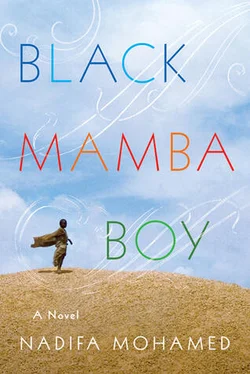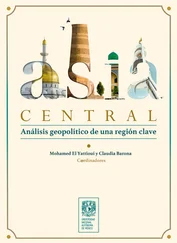1 ...7 8 9 11 12 13 ...60 Jama took the soup, his head drooping down to his chest, his heart a lead weight, and went back to his mother. He gathered Ambaro in his arms and tried to put the soup to her lips. Ambaro jerked her head away. “I don’t want anything from that bitch. Put it down, Goode.”
Jama felt a surge of power run through Ambaro. She turned her face to the window and took in a smooth, deep breath.
“Look at those stars, Goode, they have watched over everything.” The sky was as black and luminous as coal, a white-hot crescent moon hung over them like a just-forged scythe, the stars flying like sparks from the welder’s furnace.
“It’s another world above us, each of those stars has a power and a meaning in our lives. That star tells us when to mate the sheep, if that one does not appear we should expect trouble, that little one leads us to the sea.” Ambaro pointed at anonymous specks in the distance.
Jama saw only a sea of solitude, an expanse of nothingness impossible to navigate on his own.
“Those stars are our friends, they have watched over our ancestors, they have seen all kinds of suffering but the light in them never goes out, they will watch over you and will watch over your grandchildren.”
Ambaro felt Jama’s tears falling on her and grabbed hold of his hand. “Listen to me, Goode, I am not leaving you. I will live in your heart, in your blood, you will make something of your life, I promise you that. Forgive me, my baby snake, don’t live the life that I have lived, you deserve better.”
“I wanted to make you happy, hooyo, but now it’s too late.” Jama wept.
“No, it is not, Goode, I will see everything that you do, the good and the bad, nothing will be hidden from me.”
Jama pushed his face against his mother’s cheek, rubbed his moist face against hers, hoping to catch whatever she had, to go with her to the next life. Ambaro pulled her face away from him.
“Stop that, Goode. Shall I tell you what the Kaahin told your father?” she cajoled. “A great Kaahin once told your father when he was a boy that his son, the son of Guure Mohamed Naaleyeh, would see so much money pass through his fingers. Guess what your father said to the Kaahin? He asked him, ‘What’s money?’ Neither of us had seen any before, but now I know money is like water, it will give you life. Take the Kitab amulet from around my neck.”
Jama began to unpick the large knots in the string that hung the amulet over Ambaro’s chest. Folded in a paper heart lay prayer after prayer, and in this heart Ambaro kept her hope, as she did not trust her body anymore. The Arabic script had smudged and faded on the thin exercise paper the wadaad had used. “Inside the amulet is one hundred and fifty-six rupees. I do not want you using it until you absolutely need to; wait until you have grown up and know what you want to do with your life.”
Jama squeezed the amulet in his palm. He had never seen a rupee, never mind hundreds of them, his world was of ardis lost in the street, paisas to pay for stale cakes, occasional annas thrown to Abdi from the passenger ships.
“I have been saving that for you, Goode, promise me you will not waste it. Don’t tell anyone about it either, tie it around your neck and forget about it.”
Ambaro’s swamped lungs protested against her chatter and her face suddenly contorted as she gasped for breath. Jama did not believe a word of the old Kaahin’s prophecy; he knew that no boy born for a special fate would have to see his mother choking on strange liquid that poured out of her mouth and nose. Jama wiped his mother’s face on his ma’awis and held her in his arms. “Shush, hooyo, shush,” he soothed, rocking her gently. His mother fell into a curl with her back turned to him and soon fell asleep. Jama watched the rise and fall of her back and grabbed a handful of her tobe to keep himself connected. The fabric dampened in his nervous grip; she was already slipping from him. He would have preferred his umbilical cord to have never been severed but to extend limitlessly like spider’s silk between them. He belonged to no one else, she belonged to no one else, why couldn’t God leave them together?
Jama’s eyes remained open all night, scanning the dark room for any figures that might materialize to take his mother away. The gloom was alive with shifting densities, lumps of gray light that hovered slowly along the floor, furry black masses that shivered in corners. Jama’s fingers loosened their grip on Ambaro’s tobe and reached out. Ambaro’s arm was relaxed along her side, her fingers resting on her hip. Jama placed his hand on hers, she felt like one of those shells washed up on the beach, cold, hard, smooth, veins making superfluous swirls under her skin. Everything powerful and vibrant about her had gone, only the worn-out machinery of her body remained, and the little life that wondrous machinery had produced was left to grieve over everything she had once been.
HARGEISA, SOMALILAND, MARCH 1936
The chaperone finally released his hold on Jama’s forearm, leaving a sweaty handprint on his skin. Jama’s legs shook from the long journey in the back of the old lorry, and he clasped both of his thighs to steady them while his clansman went to replenish his stash of qat. Jama had put up with the mushy green spittle and the acrid stink that had accompanied the ostrich catcher’s habit for the day and night it took to cross the Red Sea by dhow and get to Hargeisa. Jama’s bloated, gaseous stomach bulged out before him and he wondered why it stretched farther and farther out the hungrier he got. His stomach had been relatively peaceful throughout the journey, but for weeks after the burial it had contracted, cramped, made him vomit, given him diarrhea, the pain in his gut slowing his steps to that of a decrepit old man. A clanswoman of his mother had found him huddled in an alley, covered in dust and blood. It took just three days for a human telephone network of clansmen and women to locate his great-aunt and deliver Jama to her like a faulty parcel. In Aden the Islaweynes had paid for Ambaro’s burial but expected Jama to look after himself. Estranged from Shidane and Abdi, he had hung out with the dirtiest of Aden’s street children, eating fitfully and badly, sometimes picking up food from the dirt and giving it a casual clean before swallowing it in a few untasting bites. He became argumentative and loud, often fighting with the other abandoned children. To appease the hungry demon in his stomach, seething and cursing from his cauldron of acid, Jama had fought with stray cats and dogs over leftover bones. He tried to be brave but sadness and loneliness had crept up on him, twisting his innards and giving him the shakes. Jama dreamed of his mother every night; she followed a caravan in the Somali desert, and he would follow, calling out her name, but she never turned around, the distance between them growing until she was just a speck on the horizon.
Jama looked around him. Somaliland was yellow, intensely yellow, a dirty yellow, with streaks of brown and green. A group of men stood next to their herd of camels while the lorry overheated, its metal grille grimacing under an acacia tree. There was no smell of food or incense or money drifting in the air as there was in Aden, there were no farms, no gardens, but there was a sharp sweetness he breathed in, something invigorating, intoxicating. This was his country, this was the same air as his father and grandfathers had breathed, the same landscape that they had known. Heat shimmered above the ground, making the sparse vegetation look like a mirage that would dissolve if you reached out for it. The emptiness of the desert felt purifying and yet disturbing after the tumultuous humanity of Aden — deserts were the birthplaces of prophets but also the playgrounds of jinns and shape-shifters. He heard from his mother that his own great-grandfather Eddoy had walked out of his family’s encampment and into the sands, leaving no one word of where he was going, and was never seen again. Eddoy became one of the many bewitched by the shifting messages left among the dunes. Though these stories of people losing their minds and vanishing terrified Jama, his mother used to tease him, telling him that it was no bad thing to have a jinn in the family and that he should call on his great-grandfather if he ever became lost. His ancestors had been crow worshippers and sorcerers before the time of the Prophet, and the people still kept tokens of their paganism. Precious frankincense and myrrh still smoldered in the same ornate white clay urns; black leather amulets hung from the chubby wrists of infants. His mother’s amulet was tied tightly around his neck, the sacred pages grubby and hardened together. He lay down under the acacia tree and spread his arms out, the sky covered him like a shroud and he felt cooled by the watery blueness washing over him, he guessed the time by looking at the position of the sun and decided to rest. He awoke, disturbed by the sound of two voices above his head, and opened his eyes to see an old woman standing over him, as tall as a policeman. She bent down to wipe the drool from his sleepy face and held him to her bosom, filling his nose with her sour milk smell. Tears beaded up in the corner of his eyes but he drew them back, afraid of embarrassing them both. Jinnow took his hand and led him away, Jama floating from her hand like a string cut loose from its kite.
Читать дальше
Конец ознакомительного отрывка
Купить книгу












